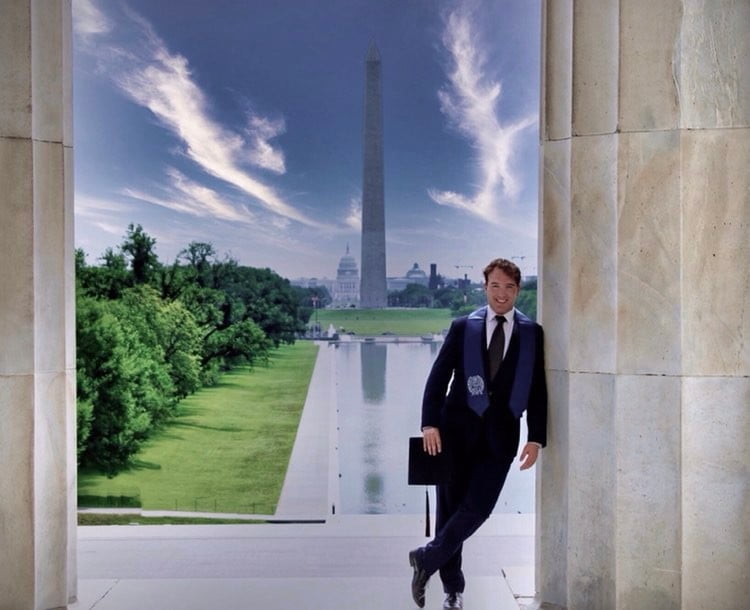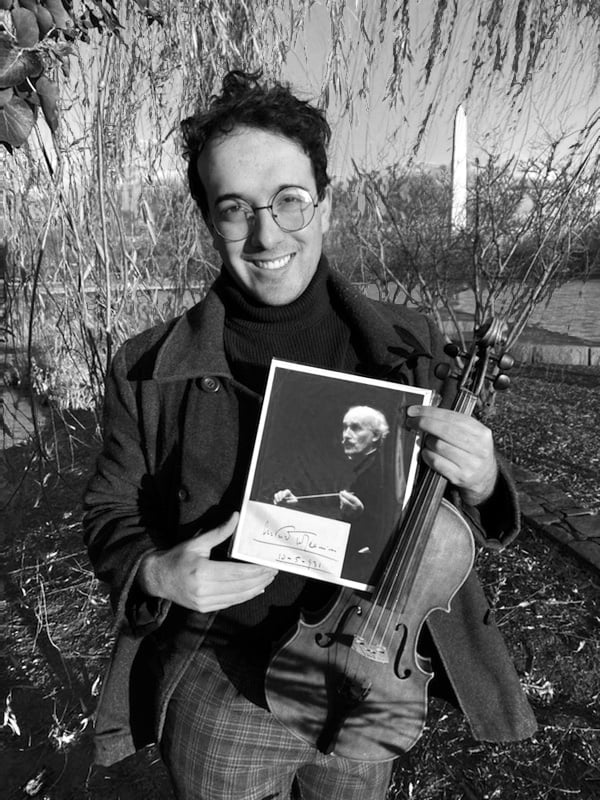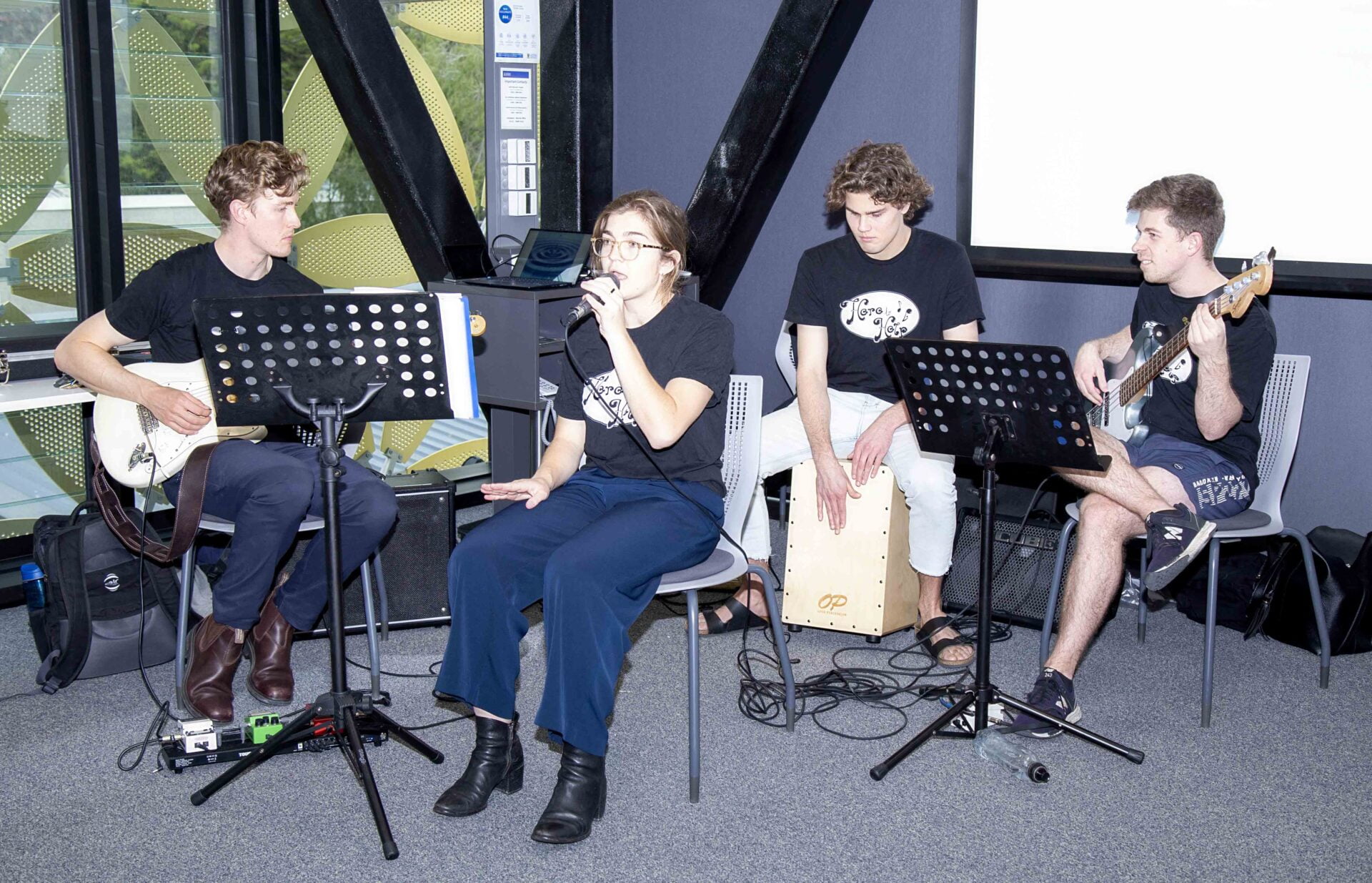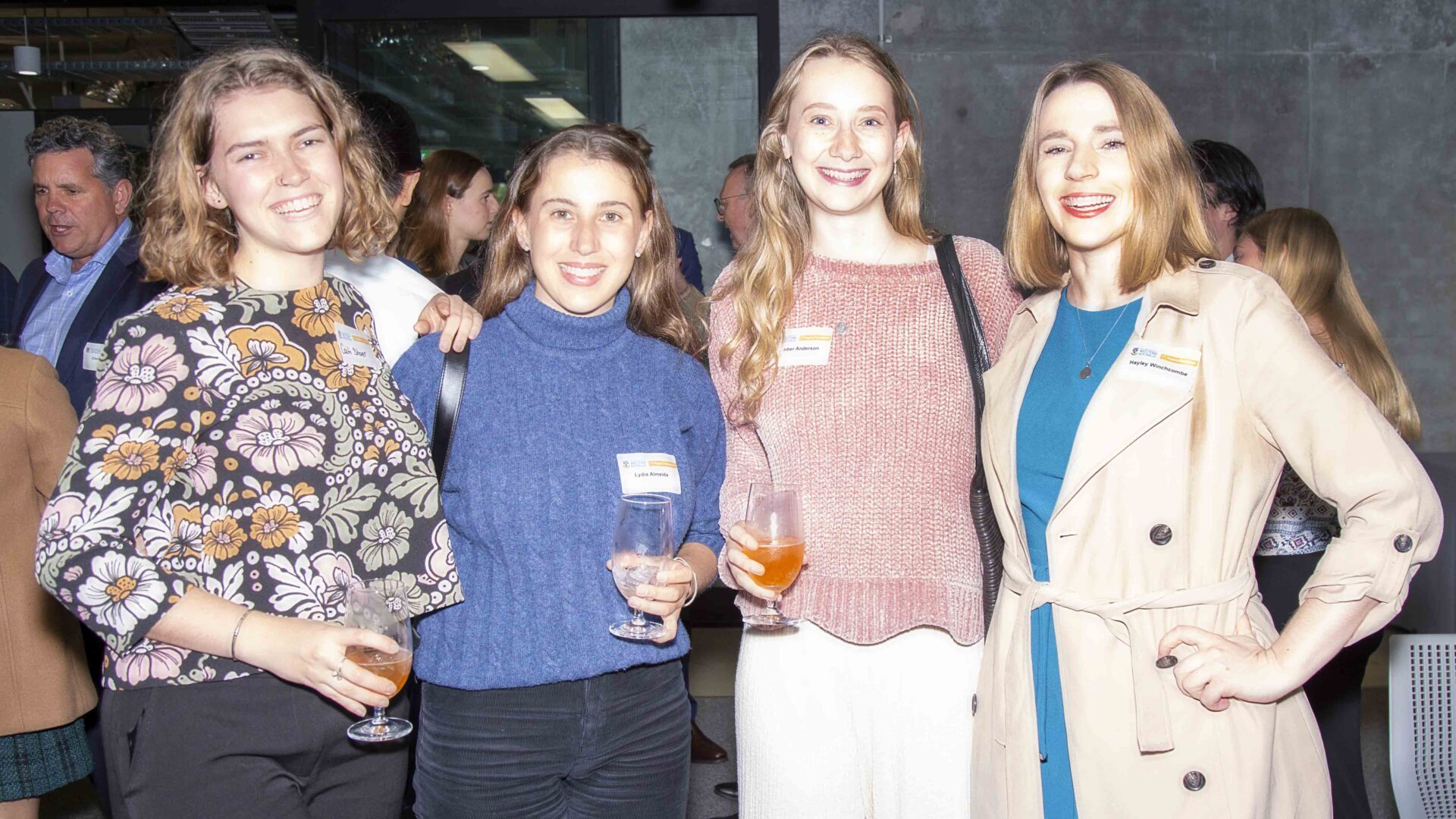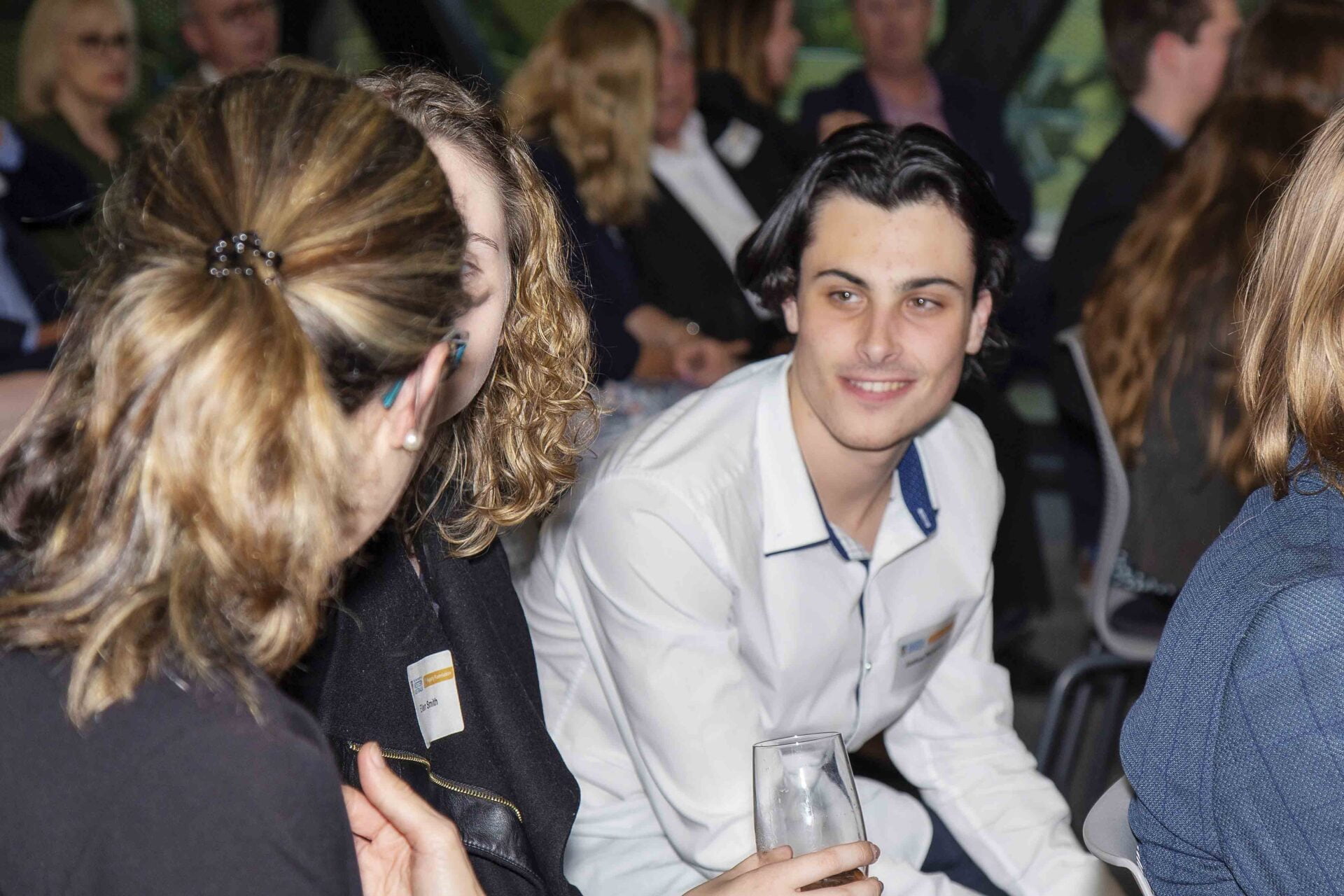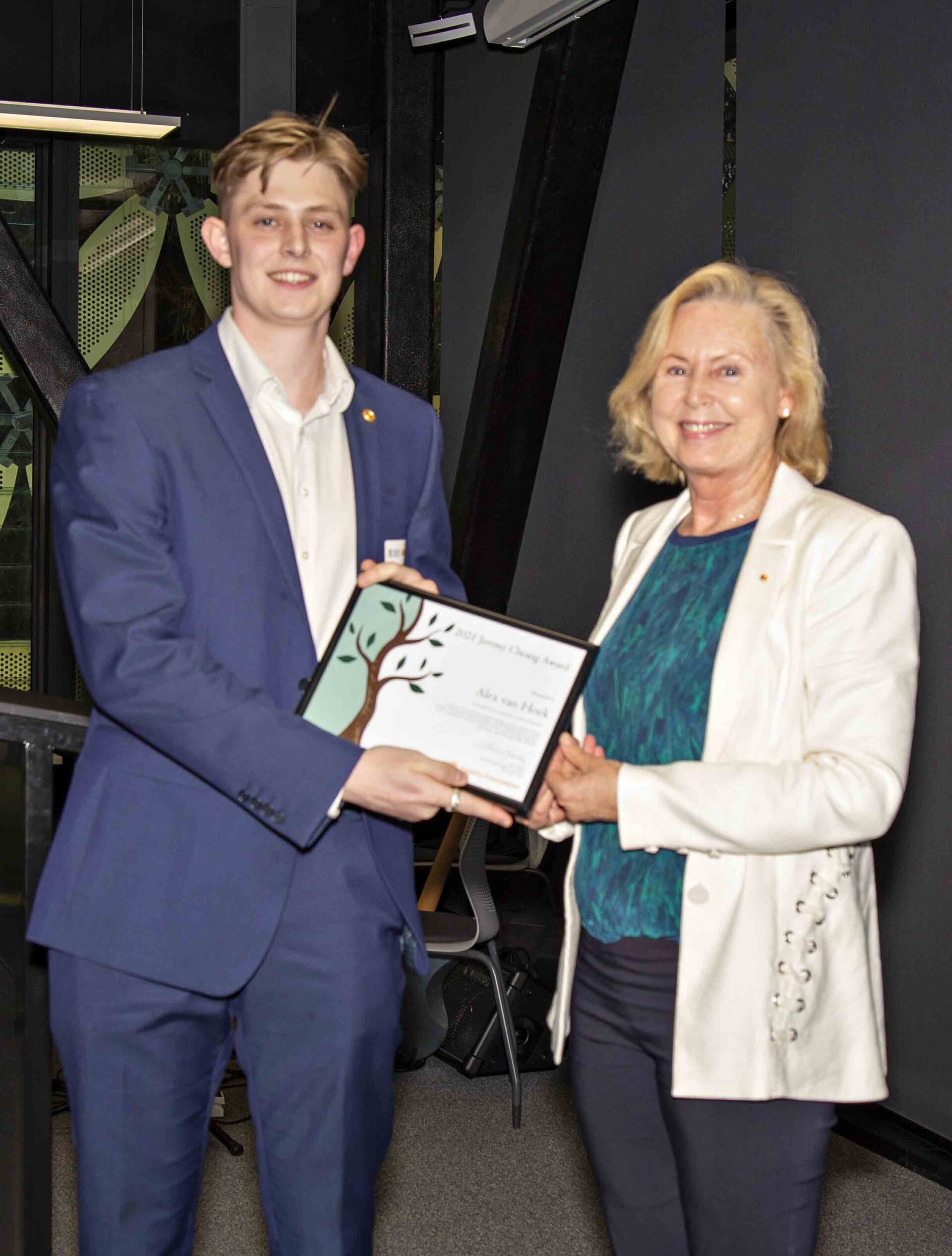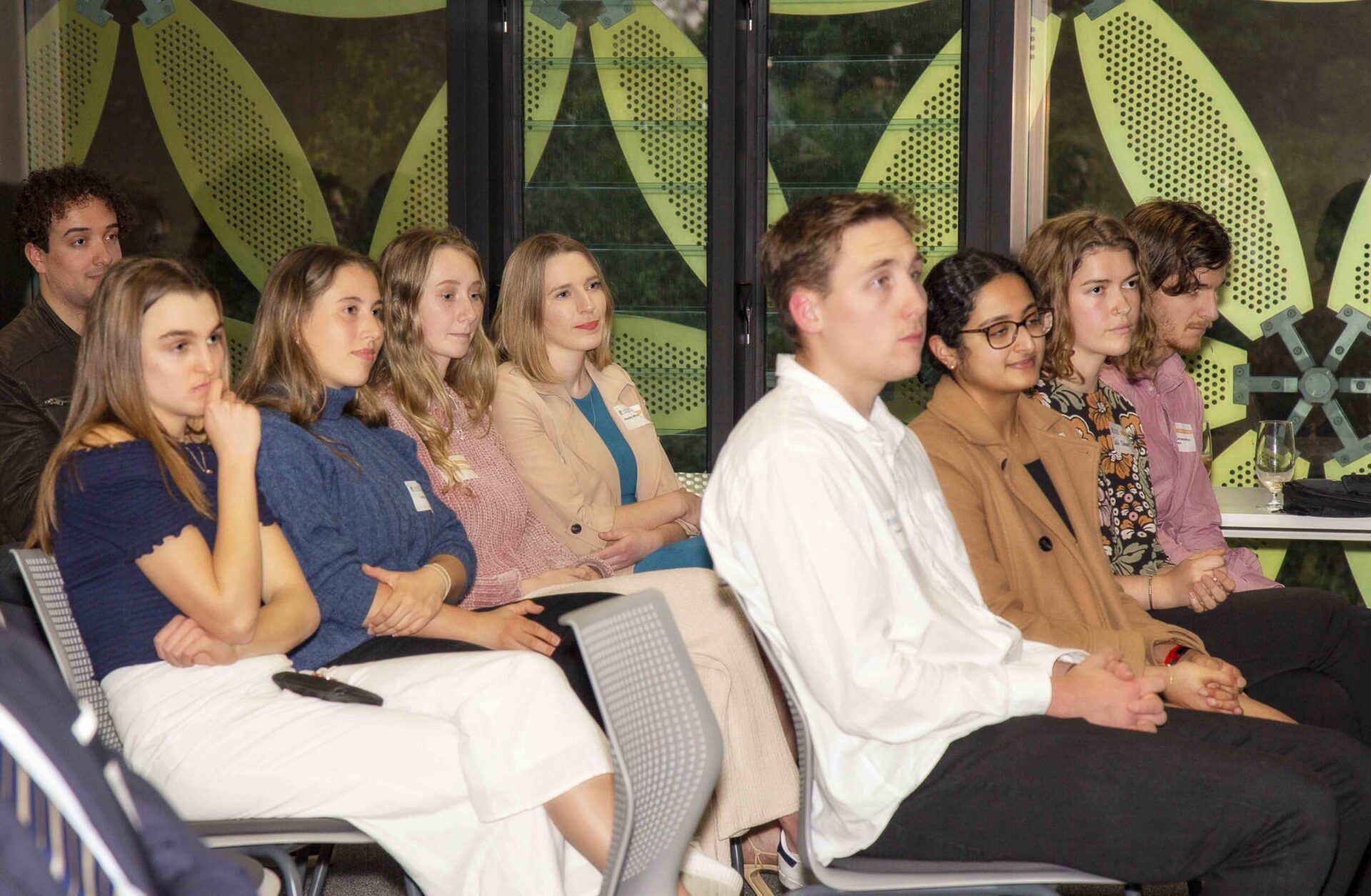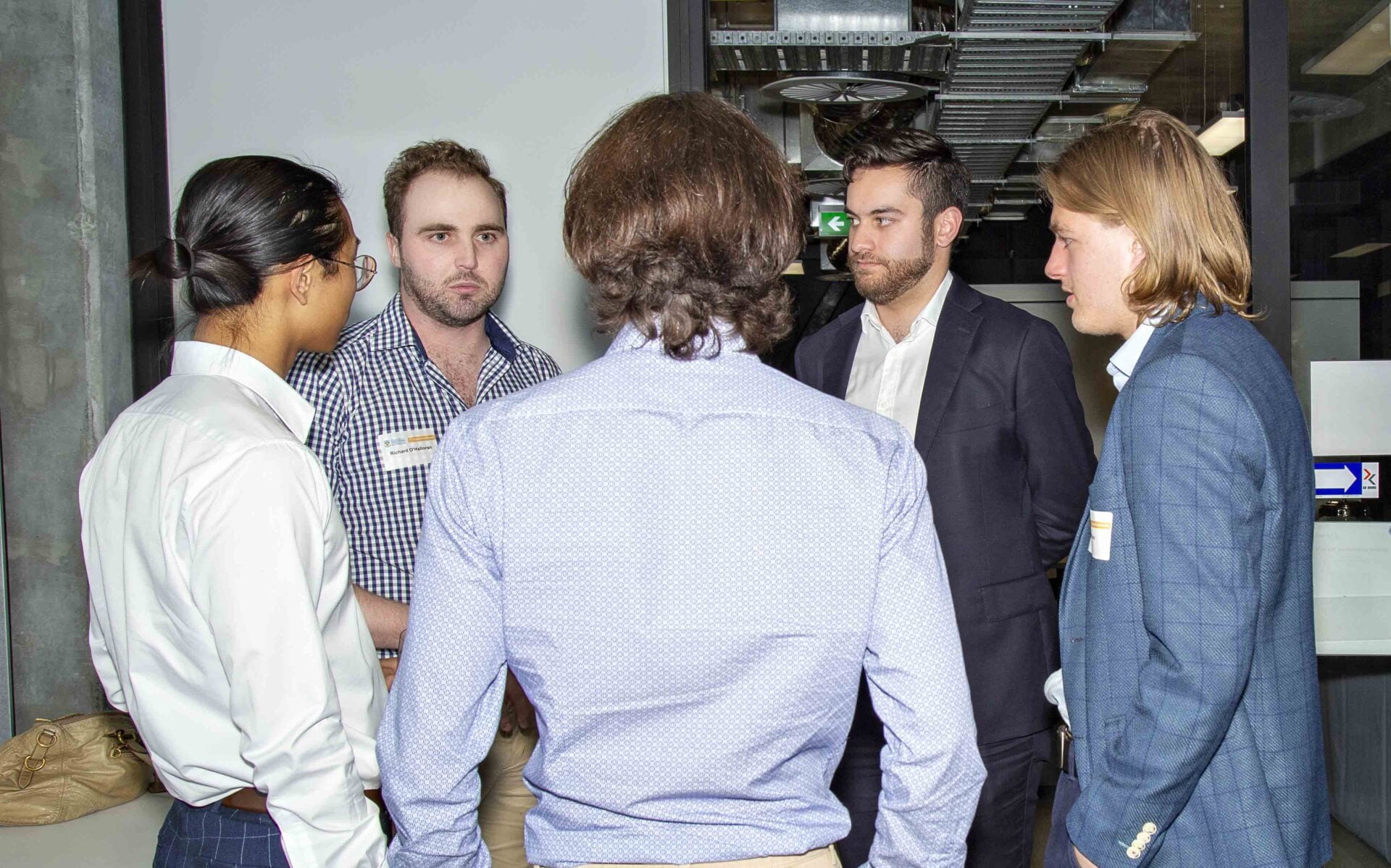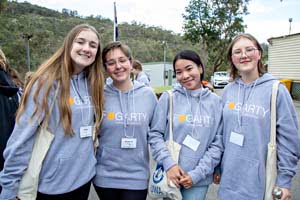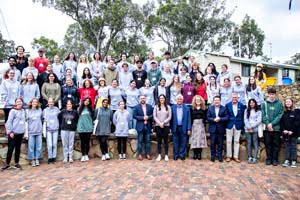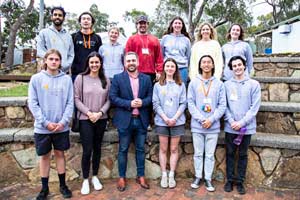Systematic inspiration for STEM
Alexander van Hoek wants to see more children with a passion for Science, Technology, Engineering and Mathematics (STEM). For this reason, Alex has developed Systematic, a not-for-profit initiative to help children foster an interest in STEM topics and skills, during their young and formative years.
“The main goal of Systematic is to break the stereotype that only ‘smart’ children can be involved in STEM. Children should be encouraged to engage with STEM activities, regardless of their educational, geographical, cultural or socioeconomic background,” Alex explained.
Alex is a UWA Fogarty Scholar studying a Bachelor of Science, majoring in Biomedical Engineering and Genetics. He has an avid interest in STEM subjects, innovations and careers and wants to share this passion with others.
“My love of STEM was inevitable with two engineers for parents, one electrical and one chemical. As a child they made sure I always saw the fun in science, how amazing and cool it could be,” Alex explained.
“I grew up understanding that STEM is part of our lives, it is all around us, even in areas we wouldn’t expect, and it helps us discover and understand the world around us,” Alex said.
Systematic is a one-stop-shop for fun and engaging STEM activities. The Systematic kit contains various toys and experiments for teachers and parents to use to inspire curiosity, engagement in learning and conversations around science, technology, engineering and mathematics. Alex hopes that by providing these tools and opportunities, educators can help to build confidence in a child’s ability to understand and master STEM concepts now and into the future.
“STEM can and will have a significant impact upon the lives and careers of all children, so why not encourage them to enjoy it from a young age, through structured play and exploratory experiences,” Alex said.
Alex was the 2021 recipient of the Fogarty Foundation’s Jeremy Cheang Award. This annual award is presented to a UWA Fogarty Scholar to acknowledge their contribution to their chosen profession, the University and/or the wider community. Alex received the award for his creation of Systematic and has been using the funding to progress the Systematic initiative to the ‘testing’ phase, due to commence in 2022.
“This phase is important to ensure that the kit contains toys and experiments which are practical for teachers and parents to deliver, while also being stimulating and inspiring for the children,” Alex said.
Alex is currently working with Venture, the Student Innovation Centre supported by the UWA Student Guild. Venture provides access to expert advice, support, and guidance, to help students navigate the innovation journey and improve innovative outcomes. Guild Venture, in partnership with the UWA Grand Challenges, also offer ‘Making a Difference’ Social Innovation and Enterprise grants to the value of $5000. Alex will present Systematic at the UWA Showcase event later in the year.
With the Foundation’s seed funding and Venture’s network, Alex is gaining support from other students and learning from entrepreneurs, including the entrepreneur in residence Josh Van Ross.
Tell us something about your upbringing
Cultural pride and diversity have always been core principles of my upbringing. As a biracial woman, my family always taught me to embrace my culture, appreciate others and live a life of service. My most distinct memories from my upbringing are the Christmas family gatherings. For this celebration, everyone would bring a dish, often a traditional dish, that we would share whilst a multitude of many different genres of music played in the background and our elders would tell stories about their lives before their journeys moving to Australia.
What did you want to be when you were growing up?
For as long as I can remember, my goal in life has been to positively impact the world, regardless of the career I chose. When I was younger, I wanted to be a lawyer so that I could fight for peoples’ rights and freedoms. As I got older, I became drawn to a career in healthcare, due to the unique position that healthcare workers are in. I see healthcare as a career whereby I could directly improve a person’s life due to my knowledge, being in the fortunate position to help others when they are unequipped to do so.
What did you learn about yourself in high school?
In high school, I learned the true extent of my mental toughness and determination. Throughout every stage of my high school career, I found my competitive nature drove me to achieve goals that often seemed out of reach. However, it was not until my final two years of high school that I learned the importance of self-care and cost-benefit decision-making. As I strived to be accepted into a medical course, I knew the discipline and determination that would be required. Subsequently, through trial and error, I learnt how to prioritise my time for the people and activities that brought me joy whilst never losing sight of my goals; culminating in success both in school and engagement with my community.
Why did you apply to be a UWA Fogarty Scholar?
I applied to be a UWA Fogarty Scholar because my values aligned with the core ethos of the Fogarty Foundation and as such, I wanted to become a part of the Fogarty community. Furthermore, beyond relieving financial constraints, being a UWA Fogarty Scholar allows me to continue engaging in leadership and volunteering roles (both within UWA and the wider community), whilst opening the door to new and exciting opportunities.
What are you studying and what do you like about the course so far?
I am currently studying Integrated Medical Sciences via the Bachelor of Philosophy (Honours) with an assured pathway to the Doctor of Dental Medicine (DMD). Although I haven’t completed any ‘dental’ units yet, I have loved learning about the anatomy of the human body and how our various systems within the body work together to form a functioning human.
Tell us something you love about UWA.
The vibrancy of the UWA community is something that I love. On the few days that I attend campus, I often engage in various activities and events organised by different clubs and Guild Organisations. I appreciate the opportunity to meet new people and love the diversity of students that attend UWA.
Have you enjoyed any Scholars events, if so, which event and why?
I have thoroughly enjoyed all the events organised thus far, especially the Scholars Breakfast as I was able to network with many current Scholars and Alumni.
What do you look forward to in Semester 2?
As the majority of my Semester 1 units were online, I am looking forward to commencing Semester 2 face-to-face and meeting more people. I am also looking forward to engaging in labs and workshops, for the medical science units, that will allow me to better my laboratory skills. Outside of class, I am excited to coordinate social events as a member of the Women’s Guild and facilitate the Fogarty Futures Leadership Conference.
David Scaife MLA will commence postgraduate studies at the Australian National University (ANU) in Semester 2, 2022. David will be the first UWA Fogarty Scholar to enjoy this esteemed partnership between the Fogarty Foundation, the Australian National University and the University of Western Australia.
share a highlight of your time as a UWA Fogarty Scholar.
The leadership program run by the Fogarty Foundation was a highlight of every year. I particularly remember attending a presentation by Andrew Forrest in about 2006 or 2007 where he spoke about his vision for FMG and the iron ore industry in WA. Looking back, I didn’t realise the significance of what I was listening to at the time!
Why have you applied for a scholarship at ANU when your career is already progressing so well?
As a newly elected Member of Parliament, I have an obligation to my constituents and to the WA public more generally to do my absolute best in this role. I see further studies as one way to improve my knowledge and skills, so that I can be an effective elected representative.
What will you be studying and how will this impact your career and future?
I’ll be studying the Master of Public Policy (MPP). Navigating life as a Member of Parliament over the last year has been challenging. There are many different stakeholders with established ways of doing things, from local constituents to public servants to lobbyists. I expect the MPP will give me greater insight into how the public service works and how to influence policy outcomes in a way that is consistent with the evidence and my values. We have an opportunity in a post-COVID world to build an Australia that is more ambitious, equal, and inclusive, and I hope to be a part of that.
Do you think there is a connection between education and positive leadership? If so, please explain.
Yes, undoubtedly. I said in my first speech to Parliament that I owe my achievements to education, and particularly public education. I have had teachers and mentors both at Australind Senior High School and the University of Western Australia who saw more in me, than I did. That encouragement has led to my leadership position now. I also think that curiosity and a commitment to self-improvement, which have a natural relationship with education, are qualities of positive leadership.
How do you think our Fogarty Scholars and Alumni can have an impact on their communities, Australia and the world?
You only have to look at the work being done by current Scholars and Alumni to see the range of ways that you can have an impact on the world. We have Alumni like Naomi Altman who is a literal rocket scientist working on delivering medical supplies by drone in Ghana, and Alumni like me who are focused on things closer to home. The important part is to pursue what you’re passionate about and good at. If you do that and keep in mind the obligation that we all have to improve our communities (whether global or local), you can’t really go wrong.
“Receiving the scholarship has been a great privilege and I’m looking forward to starting in semester 2.”
David Scaife MLA
Each year, two UWA Fogarty Scholars will receive scholarships to study at ANU. These scholarships will strengthen relations with our national university, broadening opportunities for Scholars in their careers and their ability to create the next generation of growth.
The UWA Fogarty Scholars joined Kate Chaney, independent candidate for the seat of Curtin, for an informal conversation on Wednesday. Kate said she was eager to speak with young people about the issues they are interested in.
Kate opened by explaining her background and what brought her to stand for a seat in Federal Parliament. She noted that a driving factor was her involvement on the board of Next 25, which is working to ensure that Australia maximises and shares its success across current and future generations, and her desire to play a more proactive part in addressing complex issues facing Australian society.
Kate believes her diverse career background in management consulting, law and strategy, as well as her senior corporate and not-for-profit roles, will enable her to contribute on several complex matters. She also acknowledged that there will matters she won’t know about. In talking about her decision to take the plunge to stand for Parliament, Kate said that she realised, “you only have one wild and precious life, so just go for it.”
Kate shared her four areas of focus with the Scholars, which were often touched on during the conversation with the group. These include:
- Integrity
- Climate change
- Economic opportunities and
- Inclusive communities.
The Scholars raised a wide range of topics important to them, spanning the implementation of the Uluru Statement from the Heart and how to achieve climate change through the creation of economic opportunities, to the provision of greater funding for sports beyond those with a high profile, the structural re-adjustment of industries, addressing and reducing the incidence of sexual harassment and gender inequality, to food and water security and homelessness.
How to find candidates aligned with Scholars’ individual values was also explored, and it was suggested that sites such as Vote Compass could be helpful in this regard. Kate also mentioned the site, They Vote for You which allows one to see how your electorate’s representative – or any member of Parliament – voted on various matters. Kate explained that only 0.4% of the population is a member of a political party and 50% of members of Parliament have only ever worked in politics.
The role of independents in Parliament was also explored, and Kate was asked what she hoped might result in 15 years. Three options she suggested were:
- Independents could cause the major parties to re-think their approach to various policies and their electorate.
- There could be a critical mass of independents, allowing them to work in different coalitions on various topics of interest. She noted whilst this could be logistically ‘messier’ than the two-party system, it could allow the larger, more complex issues to be dealt with more effectively (noting most of the matters before Federal Parliament are complex issues by their very nature); or
- The emergence of new parties, providing a viable alternative to the current ‘red’ vs ‘blue’ team, two party model.
The closing discussion centred on how young people could become more involved, with Kate providing several pointers. Whilst not suggesting that young people head straight for parliament, she stressed that, at a minimum, everyone should be thoughtful about their vote, because every vote counts.
Many thanks to Kate for addressing the group, and for Georgie Carey, Fogarty Scholar (2014) and now Deputy Mayor of the Mosman Park Town Council for being facilitator.
Ten of the state’s highest achieving students have accepted UWA Fogarty Foundation Scholarships, including Lawrence Nheu who was also awarded the UWA Fogarty Beazley Medallist Scholarship. Today, we had the pleasure of welcoming them to the UWA Fogarty Scholars family as they enjoyed breakfast at St Catherine’s College.
UWA Fogarty Foundation Scholarships offer the State’s brightest and most committed students a full scholarship for the entirety of their undergraduate and postgraduate degrees. Scholars are selected based on their academic excellence and outstanding achievements in leadership, community involvement, enterprise, the arts and/or sport.
Winners of the 2022 UWA Fogarty Foundation Scholarships include Lawrence Nheu, Beazley Medallist (Perth Modern), Ben Scott (Scotch College), Daniel Zhou (Christ Church Grammar School), Peter Bruce (Wesley College), Joel Peiris (Perth Modern), Shantelle Jeyakumar (Woodvale Secondary College), Naveen Nimalan (Aquinas College), Phoebe Dyson (Methodist Ladies’ College), Caleb Adams (Perth Modern) and Josh Snow (Busselton Senior High School).
Phoebe Dyson said she applied for the UWA Fogarty Scholarship Program because she saw it as an invaluable way to connect with inspiring, like-minded individuals while making the most of opportunities to grow and flourish as a leader.
“I would love to make a difference in this world, and I see the UWA Fogarty Scholarship Program as a tangible way for me to instigate purposeful change,” Phoebe explained.
“I am particularly looking forward to meeting other students in the Fogarty Scholars community and immersing myself in the range of mentoring and leadership opportunities that are provided,” commented Ben Scott, 2022 UWA Fogarty Scholar.
UWA Fogarty Foundation Scholars are provided with $10,000 per annum to assist in university tuition, accommodation and general living expenses. They participate in a tailored leadership and enterprise program, academic mentoring, leadership opportunities, support for initiatives and they become valued members of the Scholars and Alumni network.
“By empowering and enriching our high performing students, we are encouraging them to shine, and use their vision and direction to enable positive change in society,” explained Caitlyn Fogarty-Embley, Executive Director of the Fogarty Foundation.
“We need innovative and inspiring leaders and businesses in WA, which is why the UWA Fogarty Foundation Scholarships continue to be a key element of the Foundation’s work,” she said.
“We want our brightest students to call Western Australia home, where they can enjoy a world-class education and be inspired to lead, innovate, support and build the West Australian economy.”
Through the Leadership and Enterprise Program, the Foundation hopes to empower young people to be entrepreneurial creators. Many Scholars have started enterprises and not-for-profit organisations which the Foundation continues to support.
“The Scholars Enterprise Investment Program supports Scholars as they build their businesses, while enhancing WA-wide support for the next generation of enterprises, growing the number of jobs and diversity of businesses across WA and Australia,” Mrs Fogarty-Embley said.
Since 2004, the scholarships have educated and supported 176 outstanding young people who are now contributing to their communities, our state and our nation. The UWA Fogarty Foundation Scholarship Program is one of Australia’s premier scholarship programs. You can read about some of the exceptional Scholars at fogartyfoundation.org.au.
Joshua Dunne joined the UWA Fogarty Scholarship Program in 2015, studying a Bachelor of Philosophy (Honours). During his studies at UWA, Josh was passionate about his education and development, making the most of every opportunity. Awarded a Fulbright Scholarship in 2018, Josh moved to Washington DC where he completed a Master of Security at Georgetown University.
Since his return, Josh has once again shown his dedication to leadership development, as well as his ability to positively influence those around him, joining us as a facilitator at this year’s Fogarty Futures Conference and InspirED. Read Josh’s inspiring letter to our UWA Fogarty Scholars.
An Open Letter to UWA Fogarty Scholars
Like every student lucky enough to benefit from the Fogarty Foundation’s extraordinary generosity, I vividly remember the feeling of my post-WACE summer bliss being interrupted by a phone call that, though brief in length, had a profound impact on my identity. Like so many others before and since, a one-minute conversation rewrote the subtitle following my name so indelibly that – thanks to four years’ worth of events – I’m sure I have enough “Joshua Dunne, Fogarty Scholar” labels, lanyards and badges to wallpaper my bedroom.
I am fortunate to be able to reflect upon that summer’s phone call far too frequently. How fortunate am I then, to have been able to re-live the experience when a caller I thought was a telemarketer from the eastern states introduced herself as a representative of the Australian-American Fulbright Commission, informing me that my application for a Fulbright Scholarship to support my pursuit of a Master’s degree in the USA had been successful?
While separated in time, these two phone calls were anything but disconnected. My Fogarty Scholarship not only featured prominently in the written and interview portions of my Fulbright application, my four years spent engaging with and learning from the extraordinary community of scholars, professors, mentors and friends of which I was so privileged to be a member gave me a vision for my future studies that was simply non-existent prior to my time at UWA and would likely have remained so were it not for my connection with Fogarty. As much as I loathe the cliché, my Fogarty Scholarship was an education and an inspiration, two impacts that gave me the foundation from which to launch my journey to Washington DC to study at Georgetown University’s hallowed Edmund A. Walsh School of Foreign Service.
I would like to take this opportunity to share some thoughts that I hope might be of value to current and future scholars considering postgraduate study abroad, particularly in the United States. I am always hesitant to give advice to Fogarty Scholars, a group of students that have far more to teach me than I can possibly provide in the reverse, but if only by helping you avoid the mistakes I made in my postgraduate journey, I hope the following insights serve to guide you around what I see as potentially dangerous pitfalls on your path ahead.
First, there is no substitute for vision. No grade, no award, no character attribute nor any of the many skills you have surely accumulated will help you if, like a ship without a navigator, you find yourself outside Winthrop Hall, posing for posterity and Instagram in your cap, hood and gown without the faintest idea of what comes next – “all dressed up with nowhere to go”. Your vision need not come with a defined salary, location or job description. It need not be revolutionary or radical, or mirror the experience of your heroes or role models. It need not even be particularly specific. It must, however, be genuine. An authentic response to questions such as “what do I value?”, “what am I good at?” and “how can I help?” can provide you with the seed of an idea that might guide your future prospects. Take the time to develop those ideas – the more the better – and don’t be afraid to see where they lead.
Second, don’t underestimate the value of the ‘little skills’ that you’ve accumulated over the course of your secondary and tertiary education. At Georgetown, a 230-year-old Jesuit institution with some of the most rigorous academic standards you can imagine, I was surrounded by an extraordinary cohort of postgraduate students with what felt like an endless supply of original ideas, incredible ability and tireless work ethics. Inevitably however, what impeded them was not a lack of discipline or intellect, but low-level issues surrounding those skills that didn’t feature on their resumés. The ability to condense the thesis of a novel or paper into a half-page of well-constructed notes. The willingness to speak publicly or ask a concise, relevant question of an intimidating professor without anxiety or waffle. The expertise to find, cite and source two or more pieces of evidence that are in conflict, justify their disparity, and employ them convincingly in support of a broader argument. You wouldn’t expect to excel at a sport or a musical instrument without training, but too many students think they can succeed academically or professionally based on intellect or willpower alone. Take advantage of the opportunities you are given to practice these skills regularly and master them gradually – your postgraduate self will thank you.
Finally, be curious. I applied for Fulbright because I didn’t feel like I could study the world around me without experiencing it firsthand. In 2021, as legitimate questions are being asked of the ability of mainstream and social media alike to paint an unbiased image of our world and those of us inhabiting it, it is more important than ever to use your own judgement to identify the best opportunities to grow, learn and make an impact. Despite the effects of the pandemic, my two years in the USA saw me travel across much of the country: from Connecticut to Washington, Chicago to Nashville, Gettysburg to the Alamo. The predominant lesson I took away wasn’t any pearl of cultural wisdom that gives me an insight into the ‘essence of America’. Instead, it was how poorly Americans fit into any of the preconceived categories with which I was familiar. While it’s easy to label Southerners as rednecks, Northerners as uptight and everyone west of the Rockies a hippy, reality simply doesn’t conform to such lazy generalizations. To quote one of my favourite social scientists, “what lies at the core of our discipline is to realize that there exists as much, if not more diversity within any statistically relevant group as exists between them”. Embrace these differences – personally, professionally and academically – they make all three more fun.
To learn is to explore, and there are few better opportunities for exploration than those provided by Fulbright and prestigious international scholarships like it. If you had told me when I boarded my flight to the USA that the next two years would feature a once-in-a-century global pandemic, nation-wide riots and a violent election aftermath that saw an incensed mob form just beyond the doorstep of my DC apartment and launch a political assault on the seat of American democracy, not to mention a fair share of frustration, loneliness and personal tragedy, there’s a good chance I may have stayed home. However, to explore is to take risks and, despite the confluence of all of the above, I never once felt I stood to lose more by my Fulbright experience than the enormity of what I gained.
For those of you considering a similar postgraduate path, please don’t feel that you must do so alone. My high expectations of Fogarty Scholars have already been met by the members of the current crop who I encountered at this year’s Futures, but our abilities as individuals are inevitably outmatched by our collective wisdom as a community. Be true to your vision, develop your skillset and keep an open mind and you’ll be sure to navigate your application to an experience that will leave you profoundly richer for having had it.
My email is joshua@ajdunne.com. As always, let me know if I can help.
Best wishes,
Josh
The UWA Fogarty Scholars and Alumni enjoyed an evening of canapés and music on Thursday, as they celebrated another inspiring year of learning, leadership and collective accomplishment. InspirED is the final event of the year for the Leadership and Enterprise program where UWA executive and staff, past speakers and friends of the Scholarship Program are invited to see and celebrate the achievement s of the Scholars.
Here to Help – Perth’s Charity Band, founded by UWA Fogarty Scholar Michael Hooper, provided a warm welcome to guests including past and present Fogarty Scholars, Professor Amit Chakma, Vice Chancellor of UWA, Annie Fogarty, Executive Chairperson of the Fogarty Foundation and special guests.
Professor Amit Chakma spoke about the significance of the scholarship program and congratulated the Scholars and Alumni for their committed commitment to education, excellence and achieving wonderful things all over the world.
Fogarty Scholars Ellen Smith and Josh Peckover shared anecdotes about their recent adventures co-convening the Fogarty Futures Leadership Conference, while Luke Thomas shared his experiences working for the Department of Prime Minister and Cabinet in Canberra. Guests were also inspired by the leadership efforts of Michael Hooper for creating Here to Help – Perth’s Charity Band, and Rachel Tantular as she spoke about her upcoming charity Indo-Pacific Traditional Music Concert.
Alexander van Hoek was announced as the 2021 recipient of the Jeremy Cheang Award. This award is presented to a Scholars to acknowledge their contribution to their chosen profession, the University and/or the wider community and to support them in their initiative. Alex received the award for his creation of Systematic, an aspiring not-for-profit initiative to help children foster a passion for STEM topics and skills.
Thank you to everyone who attended this InspirED event. It was a wonderful opportunity to hear from UWA Fogarty Scholars who are working towards and/or acting as leaders in our community and beyond.
The UWA Fogarty Scholars hosted the 2021 Fogarty Futures Leadership Conference earlier this month. Forty-five impressive and motivated young West Australian’s were invited to join the Scholars for a four-day conference at the Bickley Outdoor Recreation Camp, where they were inspired to explore leadership and entrepreneurial opportunities in their schools and local communities.
Participants took part in a variety of workshops including Purposeful with Liz Knight, Interview Skills with Connor McLaughlin, Dr Yes and Man Up. Conference facilitators (UWA Fogarty Scholars and Alumni) mentored the group as they spoke about the importance of having cultural awareness in leadership; acted as member states of the United Nations, using problem solving, diplomacy and communication skills to respond to an international crisis; and spoke with current Scholars about leadership, university and raising their educational aspirations.
At the Politicians Panel, three levels of government were represented by an impressive line-up of guest speakers. Georgie Carey – Town of Mosman Park Councillor, Shane Love MLA, David Scaife MLA, Senator Dean Smith, Dr Katrina Stratton MLA and Rhys Williams – Mandurah Mayor, spoke to the group about various societal challenges, being a leader in the community and how they, even as young students, can have a positive and wide-reaching impact.
“Our UWA Fogarty Scholars are an outstanding group of young people and the Fogarty Futures Conference highlights how exceptional they are –, organising speakers and workshop leads running a four-day conference, when they have only just started university themselves.”
Annie Fogarty AM, Executive Chairperson of the Fogarty Foundation.
“The Scholars have highlighted that when provided the opportunity, their strong leadership qualities truly shine, empowering them to make a difference to the lives of others. This really is the ripple effect in action” she said.
The Fogarty Futures Leadership Conference was initiated by the Fogarty Scholars’ Association in 2013 and has been convened by first year Fogarty Scholars every year since.
You can find out more about Fogarty Foundation and the UWA Fogarty Scholars by visiting https://fogartyfoundation.org.au/.
UWA Fogarty Scholars participate in a range of programs, conversations and events to develop leadership skills and encourage enterprising mindsets.
On Thursday 23 September, the Foundation hosted an Innovation Panel with Danail Obreschkow, Astrophysicist and Head of the International Space Centre UWA, Olivia Humphrey, Founder and former CEO of Kanopy, and Brodie McCulloch, Founder of Spacecubed. The purpose was to encourage Scholars to have an enterprising mindset and see opportunities rather than barriers, learnings rather than failures and make the most of their experiences and connections.
Danail Obreschkow spoke about his journey, including his experiences at Oxford University and his love of Astrophysics. He encouraged the Scholars to take chances, fuel their minds with inspiration and learn from others through positive connections and conversations.
Olivia encouraged the Scholars to have a challenge mindset; that is, a mindset that encourages inspiration and excitement when faced with a challenge. She spoke about building strong networks and the importance of having enterprising friends and/or peers to workshop and develop business ideas.
Brodie shared his experiences as Founder and CEO of Spacecubed. He explained how the organisation was supporting entrepreneurs and innovators with enterprise skill development, peer support networks, innovation workshops and spaces to develop a business. He encouraged the group to try out their ideas, talk to people and make the most of assets like Bloom.
Many thanks to Conor McLaughlin, Fogarty Scholar and young entrepreneur, for moderating this inspiring panel.
Why did you apply to be a UWA Fogarty Scholar?
For years, the Fogarty Foundation has been renowned as a leader in the advancement of education and giving back to the community. It is these fundamental beliefs that really drew me to apply. I read a book many years ago and in it, the main character’s motto in life was to, ‘leave the world a little better than you found it.’ This really resonated with me, becoming my motivation in my last years of high school, whilst doing voluntary work and in my personal development. I believe that at its core, the Fogarty Foundation strives for a similar outcome and I felt that becoming a Fogarty Scholar would provide me with many opportunities and ideas regarding making this positive difference in the world and giving back to the community.
What are you studying and why have you chosen that field?
I am studying a double major in Biochemistry & Molecular Biology and Immunology & Microbiology. I find the areas of Biochemistry, Molecular Biology and Microbiology especially interesting as I am eager to discover and begin to understand all the microscopic processes and changes that occur literally under our noses, especially those we cannot see or even begin to comprehend. I am also keen to delve more deeply into the mechanisms of life, and through my understanding of many of these concepts, be able to assist in areas such as immunology and genetics, and hopefully contribute to great improvements in fields such as human health.
What do you aspire to be in the future?
I aspire to be an innovative leader in areas such as human health or genetics, either involved in research or out in the field, actively making a difference. I would love to be able to assist those less fortunate than me, as I have always been aware of my relatively privileged position in life, and I would love to be a part of a movement towards equality.
What positive changes would you like to see in the world, and how will you contribute to these changes?
I have always been aware of the stark contrast in the standards of living between the developed and the developing worlds. I would love to see, and be part of, a global movement towards equality, especially in areas such as human health. I am keen to become qualified in areas such as immunology and molecular biology to understand the causes behind major diseases and afflictions, and hence, be able to promote healthy changes in developing countries.
Who do you look up to and why?
I have always been interested in the sciences and have been lucky enough to grow up in an era where girls entering STEM industries are highly encouraged. My godmother, Megan Maher, is an Associate Professor in Chemical Biology at Melbourne University, and has throughout her career, received many awards for her pioneering work, such as the Georgina Sweet Award for Women in Quantitative Biomedical Science in 2017. Megan followed her natural passion at a young age, when women in the industry were few and far between. She worked hard to achieve her goals and is now using her knowledge to give back to others. Her drive and resilience make her a great inspiration to me.
How is university life thus far?
The intricacies of university life have been a lot to adjust to, but despite the initial shock, I’m loving it. The independence is so different to high school, and the amount of self-direction that is expected is refreshing. I really like how the lecturers and professors treat us as adults and are more than happy to be challenged and engaged in discussions. At high school, my favourite subject would have been the highlight of my day, but here, every unit is just a different aspect of my favourite subject, and it makes studying (almost) enjoyable!
What have you found good/bad/fun?
One of the things I love about university is how it is a meeting place for people from all around Perth. I have reconnected with many old friends from a variety of places, and it’s easy to bond over little things like the insane number of lectures we’ve yet to watch. I also really like how Reid Library is the central hub of campus – it is so easy to pop in and grab a coffee, watch a lecture, or just have a chat with a friend. The biggest struggle for me so far has been the sheer size of campus – I find walking the kilometre from my bus stop to my chemistry lab so much more tiring than it should be and have learnt to plan my days based on the locations of my classes. All in all, I really love the freedom afforded to me by the style of learning that university offers.
Have you found any great places to have a coffee or eat while at uni?
I must admit, I have done my fair share of trying out all the options, and I have enjoyed everywhere I’ve been. I do find myself at the Quobba Gnarning Cafe in Reid Library all too often as it is just so convenient to pop in and have a look around rather than beginning that next quiz. I love the smoothies from Hackett and I’m a fan of drinking my coffee out of a mug instead of a take-away cup, so I often pop in there to check some emails or just to enjoy the cozy space. One thing I have noticed though, which I must recommend everyone tries, is that no matter where you go on campus, the caramel slices are divine! I have tried them from Quobba Gnarning, Catalyst and Hackett, and so far, I can’t fault them!
